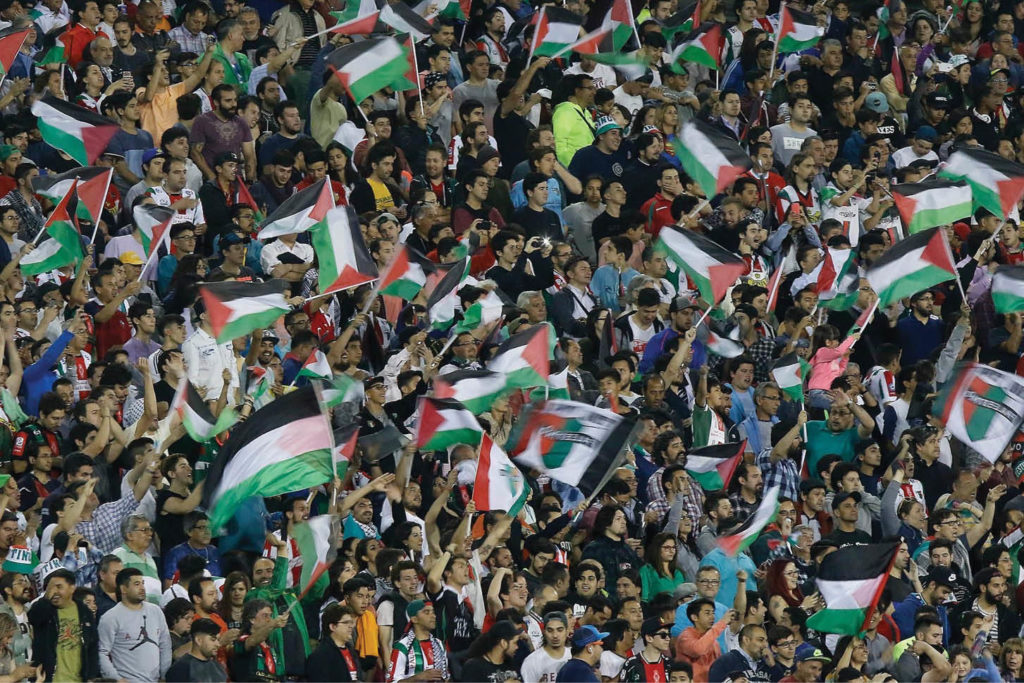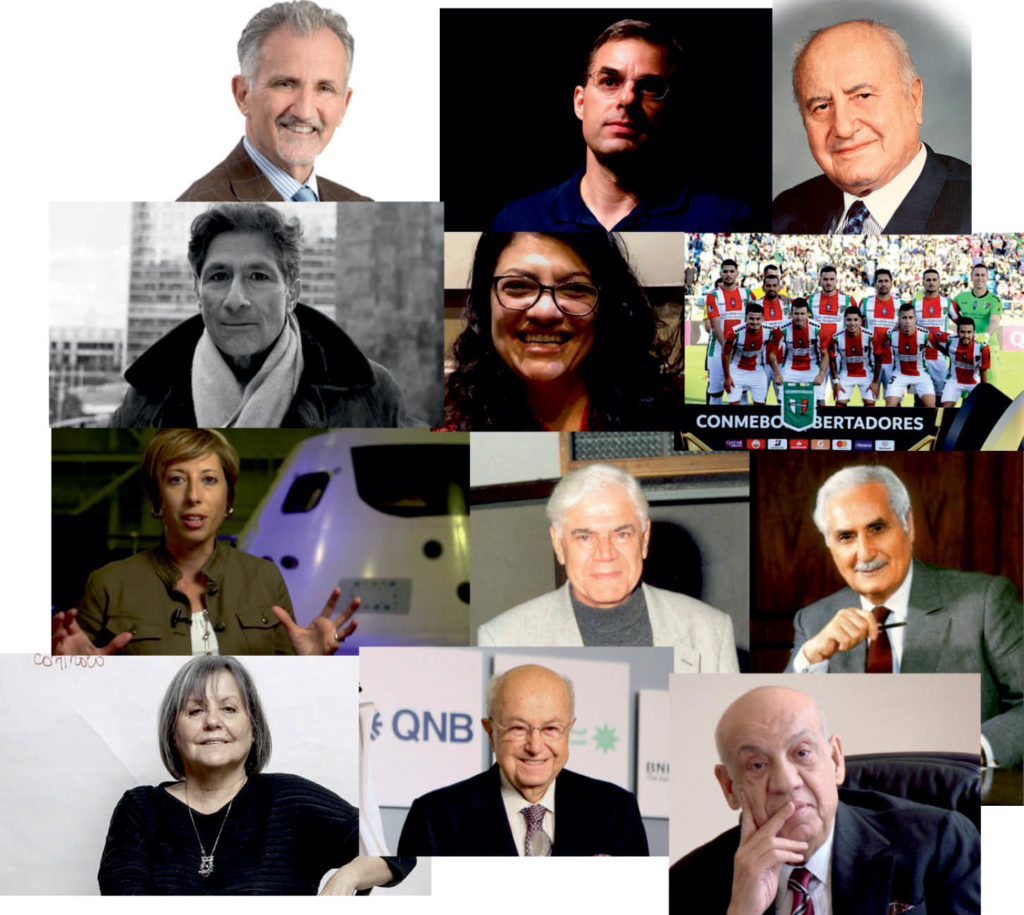We have no accurate numbers to assess the size of the Palestinian expatriate community nor do we have exact information regarding their conditions or the full extent of their achievements. The main reasons for this lack of information include the conditions under which Palestinian diaspora communities were established. Palestinian immigrants arrived in their adopted countries holding a variety of means of identification. In most cases, they presented Ottoman documents, British papers, refugee identity papers, or Jordanian or Israeli passports. Only after the signing of the Oslo Agreement, the Palestinians who in 1967 lived in the occupied territory (Gaza and the West Bank, excluding East Jerusalem) and their descendants received Palestinian passports. But these are a minority compared to those who live outside Palestine.
But Palestinians have not needed official papers to identity with Palestine. The Orientalist statements of numerous Zionist and Israeli leaders who have claimed that Palestine were a “desert inhabited by a few Bedouins,” or “a land without a people for a people without a land,” as well as Golda Meir’s statement that “there are no Palestinians” and Ben Gurion’s false prediction that “the old will die and the young will forget” have proven to be political marketing to justify their policies and wishful thinking. These assertions were far from objective descriptions of reality.

A decisive moment in Palestine’s history, the Nakba caused the forcible displacement of almost two thirds of the Palestinian people. Yet while it shaped the identity of its nation, it did not cause it to vanish. On the contrary! The year 1948 marks the beginning of thousands of stories that reflect the resilience of a nation that is determined to keep its name and country, Palestine, on the map.
Many could not handle the march into exile and died on the way. Countless babies did not survive the cold winter of 1949 because they were without safe shelter. But many of those who survived the Nakba have become successful, established themselves all over the world, and are contributing to all aspects of society. They form the continuation of a Palestine that was disrupted in 1948 and are testimony to a country that has some of the highest educational, economic, and artistic indicators in the Arab world.
Even before 1948, interaction with different cultures, learning foreign languages, or setting up enterprises were activities not unfamiliar to many Palestinians. Palestine was home to a sophisticated urban elite with many international connections. Jaffa, Lydda, Ramleh, Jerusalem, Bethlehem, Haifa, Nazareth, Gaza, and the surrounding villages all had dealt with foreigners. Moreover, there were the Palestinian emigrants who had established themselves abroad before the Nakba, such as Palestinians in the Americas who largely emigrated in a broad migratory wave from east to west in the late nineteenth and early twentieth centuries.
Unlike other immigrants, such as the Irish, Italians or Greeks, Palestinians soon had no place to go back to.
As expressed satirically by Palestinian-American lawyer and comedian Amer Zaher, “We have to be successful because we don’t have a Plan B.”
The “Social Guide of the Arab Community of Chile, 1941,” a comprehensive census of Arabs in Chile, names hundreds of families from Palestine. Many of these families came from Bethlehem, Beit Jala, and Beit Sahour. Yet locations such as Jerusalem, Gaza, Nablus, Safad, Jaffa, Taybeh, Deir Jarir, and even the Druze town of Horfeish are mentioned, among others, as places of origin as well. A quick search into the archives of “The Arab World” (“El Mundo Arabe”), a paper that for decades published news on the social, cultural, and political activities of the Arabs in Chile, indicates the achievements of Palestinian lawyers and medical doctors during the 1940s. Their campaign against the 1947 partition of Palestine aimed to secure Chile’s abstention in the voting on UN Resolution 181. One of Chile’s first reactions to the Nakba was the professionalization of the “Palestino” football team. This was done with the main goal of keeping the name Palestine alive. The move was successful, as Club Deportivo Palestino moved to the Chilean top league in 1955 and stayed within the top teams of Chilean football for almost 70 years. Today, the team is sponsored by Bank of Palestine in what has become a role model for relations between the Palestinian private sector and Palestinian diaspora organizations.

In North America, several Palestinian communities had been established after the First World War. Many of the early immigrants coming from Ramallah and the surrounding villages, they constituted the first generations of university graduates who have well integrated into their new societies. Soon after 1948, Palestinians began adapting to their new realities abroad. In the 1950s, the young generation established the General Union of Palestinian Students (GUPS), based on a student movement that had its roots in the 1920s, to represent the increasing number of Palestinians who were seeking a higher education.
From the resulting professionals, many moved to the Arab Gulf where they were instrumental in the building of institutions. For example, president Mahmoud Abbas, a refugee from Safad, worked in 1957 as a teacher in Qatar, having pursued his education in Syria. And even though many had lost all their belongings, resources, and investments in 1948 – especially those who had relied on agriculture – successful Palestinian enterprises such as the Arab Bank, established in Jerusalem by Abdel Majid Shoman, or the Mercedes Benz franchise for the Middle East, held by the Gargour family in Jaffa, endured and continued operating after having moved their headquarters to Amman and Beirut respectively.
Considering the many achievements of Palestinians in exile and in the diaspora, one may simply call to mind the verses written by the late Palestinian poet Mahmoud Darwish “I shall write a phrase more precious than honey and kisses: ‘Palestinian she was and still is.’”
Among the most successful enterprises established by Palestinian refugees is the Consolidated Contractors Company (CCC), founded by Said Khoury and Hassib Sabbagh from Safad. Many Palestinian engineers found jobs in what became the largest construction company in the region. Another source of employment for Palestinian engineers was Al-Hani Construction and Trading firm, established by Abdel Mohsin Al-Qattan, a refugee from Jaffa who participated in the foundation of the Palestine Liberation Organization (PLO) and established a foundation that has successfully contributed to the development of the homeland. The turbulent fate of Yousef Beidas, the Palestinian banker who succeeded in Beirut yet ended up being persecuted by the Lebanese State during the sixties, shows that things were not always easy. Nevertheless, many Palestinians managed to excel. By the 1950s, some of the largest textile companies in Chile and Peru were owned by notable Palestinian families such as (Abu) Yarur, Sumar and Sa’id. Indeed, success stories have continued to multiply and cover all aspects of life. They range from Palestinians serving as diplomats in New York and other foreign capitals (representing Arab and other countries), to government officials, medical doctors, lawyers, engineers, technicians, businesspersons, artists, university professors, and more.
The family of John Sununu, President George W. Bush’s chief of staff, once owned a house in Talbiyah, West Jerusalem. This was not far away from the Bisharat Villa, known as “Haroun Al Rashid,” that was looted in 1948 and later occupied by Israel’s prime minister Golda Meir. Their grandchild, George Bisharat, is a professor and one of the most distinguished commentators on Middle Eastern issues in the United States. In the same neighborhood was the home of the late Edward Said, a professor at Columbia University who is considered to be the greatest among Palestinian intellectuals and whose master piece, Orientalism, constituted a turning point in the studies of the East. He was very close to another outstanding intellectual, Ibrahim Abu Lughod, a refugee from Jaffa (known by Palestinians as the “bride of the sea”) who lived for many years in the United States, with one of his main concerns being the education of Palestinians. When after the signing of the Oslo Agreements a number of foreign consultants were sent to Palestine, Abu Lughod asserted, “We cannot depend on achievements of other societies. We need to generate our own specialists on the ground.” He returned to Palestine to engage in and contribute to forming Palestinian professionals. His efforts are honored through the Ibrahim Abu Lughod Institute of International Studies at Birzeit University. His funeral in May 2001 ended with a “secret” burial in his hometown Jaffa, as Israel would not have permitted his return to birthplace, even if in a coffin. Dozens of Palestinian flags were raised in the “bride of the sea,” honoring Abu Lughod’s dedication to his country and his people.
The successes of Palestinian Diaspora members are various, whether collectively, such as in the Palestino football team in Chile, or individually, as in the case of thousands worldwide. An article in The Atlantic, published in 2012 in the context of Republican presidential candidate Mitt Romney stating, while visiting Israel, that Palestinians are poor “because of their culture,” quoted former President Bill Clinton as saying, “I have never met a poor Palestinian in the US.” The message is clear: Wherever Palestinians have been given the freedom to create and grow, they have not only succeeded but also become important contributors to their host countries’ development and social fabric. For this reason, many are not surprised to see Rashida Tlaib and Justin Amash being elected to the US Congress, Diamela Eltit receiving the Chilean National Prize for Literature, Dr. Imad Meri being recognized by the Russian Ministry of Health, Dr. Ramzi Khamis being hailed as one of the most talented cardiologists in London, or leading scientist Nujoud Merancy working for NASA, among many others.

Freedom is precisely what Palestinians have been denied in the homeland. And while some have insisted that economic development is possible under Israeli occupation, as voiced recently in president Trump’s plans, most agree that without sovereign control over its natural resources, borders, and destiny, Palestinians cannot possibly reach their full potential. Even though they are a resilient nation that has proven elsewhere what it can accomplish and could make of Palestine – if given the chance.
While the lack of official figures certainly undermines the prospects of networking and of cooperation between the Palestinian diaspora and the homeland, it should not be considered an unsurmountable obstacle to the implementation of changes into relevant Palestinian structures that would allow these institutions to further integrate all Palestinians.
The integration of their successes into the national narrative, moreover, will not erase what Palestinians have faced in exile, including the persecution of Palestinian refugees in Iraq after the US invasion, the further displacement of Palestinian refugees in Syria, or the dramatic conditions of Palestinian refugee camps in Lebanon. Israel’s control over the Palestinian population registry and over all border crossings continues to impede the ability of millions of Palestinians to contribute to the development of their homeland. Yet none of this will take away the pride Palestinians feel when they consider that despite numerous attempts at eliminating the term Palestine from the international lexicon, Palestinians not only continue to exist, they are actually thriving.


